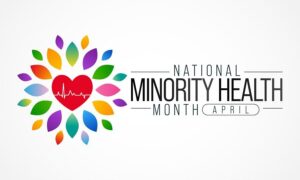Monthly Newsletter
National Minority Health Month and California Life Sciences
April 2024
National Minority Health Month and California Life Sciences
April is National Minority Health Month (NMHM), a time to raise awareness about the importance of improving the health of minority communities and reducing health disparities.
There is no dispute that deep-seated healthcare disparities and inequities exist in California and across the nation. According to the National Institutes of Health (NIH), “health disparities are differences and/or gaps in the quality of health and healthcare across racial, ethnic, and socio-economic groups.” They are the result of centuries of systemic racism in economic, housing, education, criminal justice, and health care systems.
For communities of color these disparities result in a lack of access to treatment and health coverage, chronic health conditions, declining mental health and increased mortality, and a lack of research in treating diseases that primarily effect minority communities. The need for health care diversity in the workplace, educational settings, health organizations, clinical trials, and research is essential in order to ensure access to all life-saving treatments for anyone who needs them.
Alleviating health disparities requires a deliberate, sustained, and multifaceted effort. California Life Science companies are working to lead the way toward systemic solutions to achieve real, measurable results now and well into the future. Research has shown that having clinicians, scientists, and clinical trial participants of color can be one of the primary factors in determining health outcomes and that those solutions must start at the top.
There is still a lot of work to be done. A 2022 report from Business Insider found that nearly 80% of Biotech CEOs are men, and 70% of CEOs are white. The report noted that in 2021, people of color made up 38% of the workforce, but only 24% of executive teams and 28% of CEOs. When it comes to life science, an industry built on innovation, diversity is key to producing these innovative breakthroughs. When there are people with varied backgrounds sitting in the boardroom, making venture capital decisions, working in the labs running teams of scientists, then a variety of ideas, perspectives and priorities contribute to the research and development of treatments that heal some of the world’s most challenging diseases.
Achieving greater diversity in clinical trials also equates to the development of better, safer, and more effective ways to fight diseases that often disproportionately impact diverse communities. Since different drugs have wide-ranging effects on various racial and ethnic groups, it’s important to have representation of diverse populations during clinical trials in order to develop medicines that address the needs of the whole population. To date however, clinical studies fall short of diverse representation:
- A 2022 study found that among the 20,692 US-based trials with reported results on gov, only 43% reported any race/ethnicity data.
- African American/Black patients make up 4% of the population but only 5% of trial participants.
- Hispanic/Latino patients make up 1% of the population but only 1% of trial participants.
- Non-Hispanic white patients make up 60% of the population but over 77% of trial participants.
Life science companies have committed billions of dollars in donations, training, tools, tech, and HR strategies to improve health equity and reduce health disparities in the US. The following are some examples:
- Amgen’s comprehensive health equity efforts work to advance policies and practices in support of achieving health equity so that more people have an opportunity to improve their health outcomes including their Health Equity Challenge and Representation in Clinical Research (RISE).
- Bristol Myers Squibb is committing over $300 million over the next 5 years to increase diverse suppliers and continue to increase Black/African American and Hispanic/Latino representation at all levels of the company.
- Genentech expanded its pioneering Advancing Inclusive Research® Site Alliance across the U.S. They also invested $964.2 million with diverse suppliers; increased the pipeline of diverse STEM talent by collaborating with local community and state colleges; and narrowed racial, ethnic, and gender gaps in their leadership by increasing women’s representation in Director and Officer roles to 52.5%.
- Gilead is championing health equity for all, through initiatives like its ‘Advancing Health and Black Equity and Racial Equity Community Impact Fund.’
- Novartis and the Novartis US Foundation have pledged $13.7 million through a 10-year commitment with Thurgood Marshall College Fund, Morehouse School of Medicine, 26 other Historically Black Colleges, Universities and Medical Schools and others to address root causes of disparities in health and education. They will also invest $20 million for 1,200 Black and African American students to pursue health, science, technology and business degrees.
- Novo Nordisk sponsors several programs improving public health and their clinical trials are designed with a focus on DEI&B. Their long-standing commitment ranges from large-scale relationships with the American Diabetes Association and the National Hemophilia Foundation, to local efforts to educate and support minority and underserved communities.
- Pfizer is working to end healthcare disparities by leading and contributing to a variety of initiatives, programs, partnerships, and investments with initiatives like Pfizer’s Multicultural Health Equity Collective and Institute of Translational Equitable Medicine.
For more information and education on health equity visit the:
- National Minority Health Month page to find resources to improve health outcomes through our cultures, communities, and connection.
- National Minority Quality Forum, the nation’s largest health equity research, education, and advocacy organization leading the charge for health equity.
- All of Us Research Program, a monumental effort to build the most diverse health database in history.
Stay informed on the latest news and trends on the economic and health benefits of this industry by visiting CABiotech.org
If you have any questions about hosting informational briefings for your colleagues serving in the legislature, contact California Biotechnology Foundation Executive Director Patty Cooper at (916)764-2434 or [email protected].



